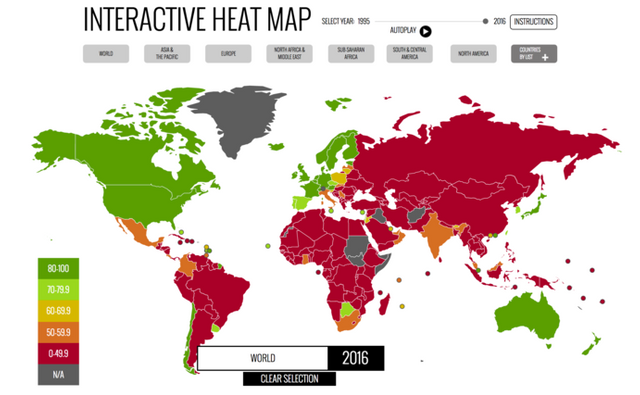The Dark Side Of Enforcing Property Rights In Another Country

Property rights are the cornerstone of a healthy economy and critical to individual freedom. Without property rights there is little reason to invest in productivity, and so it's little surprise that societies with poor property rights tend to be the poorest.
Just a casual look at this heat map overlaying property rights around the world shows how correlated they are to prosperity. Rich countries have strong property rights, those that tend to be economic basket cases have the opposite.

A Little History
So property rights tend to be a good thing and if we care for human prosperity and alleviating suffering, we should advocate expanding such norms around the world. There is a critical difference, however, in safeguarding property rights in your own country versus enforcing them for your citizens in foreign countries.
The U.S. has a bloody history of using its military to protect the property of some of its citizens when they make investments abroad. What's often glossed over in American history books are the series of military occupations, police actions, and interventions in Central America and the Caribbean between the end of the Spanish-American War and the Good Neighbor Policy of 1934. These bloody exercises of power have become known as the Banana Wars due to at least one of the common motivations being to protect fruit company interests in the region.
I first learned about these invasions in my senior year in R.O.T.C. from a fellow officer candidate originally from Honduras. We each had to choose a period in U.S. military history to present strategy and tactics to our classmates; he chose one closer to home for his family. Then I married a hot Nicaraguan chick and I've since learned a lot more traveling to the country for the last half decade. There's a reason why baseball is the most popular sport in the region and it has to do with Marines occupying the country for decades!
Watching Netflix's Cuba Libre last night and hearing the same stories of U.S. dominance, occupation, and support for a brutal dictator (Batista) largely in the name of protecting U.S. business interests in the country got me thinking about this from an economic perspective.
You Get More of What You Subsidize
The first thought that came to mind is that you always get more of what you subsidize. In the case of subsidizing security and property rights for U.S. firms investing abroad, it induces more overseas investment in riskier regions than would naturally occur.
Without U.S. government implicit and explicit guarantees on security and property rights for firms investing abroad, companies wishing to do so would internalize the real costs themselves. This means that U.S. firms would endogenously account for the full incidence of geopolitical risk when making go / no-go investment decisions in other countries.
The Agency Problem of Separating Cost and Benefit
Offloading part of the cost of geopolitical risk to U.S. taxpayers encourages businesses to invest more than they otherwise would in risky parts of the world and hence amplify profits when things go well. Unfortunately for taxpayers who have nothing to do with these businesses or their successes, they're stuck with many costs when things don't go well.
Antagonizing the Locals
Latin America's history is one of military conquest, genocide, racism, and slavery. Land and other property distributions in late 19th and early 20th century Latin America had little to do with peaceful markets and more to do with the remnants of the last few centuries of slavery.
In the long run, societies prosper from openness, trade, and business, but this fact shouldn't be considered myopically as justification for intervening militarily on the behalf of any business abroad. Look at that heat map again and let it sink in that strong property rights do not exist in most of human society.
Most of the world is not free and when U.S. businesses enter foreign markets they often must do so with the support of local governments; their property, licenses, and other trade rights tend to become dependent on stability in the power structure, which could mean supporting repressive governments. This naturally puts such businesses at odds with the repressed!
Not only do the repressed in such countries see the U.S. businesses as enjoying privileges they, themselves, do not posses, but the businesses end up supporting the authoritarian regimes. This is a bad alignment of incentives and works towards subsidizing repression and enabling bad regimes to remain in power longer.
Putting It All Together
Economics is rarely clear cut, and in this case we can see the benefits of supporting U.S. businesses abroad as higher profitability for those businesses; the downsides are less evident because they're more nuanced and costs diffuse, but their effects are measured in blood and a whole lot of treasure wasted in seemingly perpetual warfare.
Militarily supporting U.S. businesses abroad also fosters an image of imperialism that has unfortunately supported terrible regimes such as the Sandinistas in Nicaragua, the Castros' enslavement of Cuba, and Chavez's Bolivarian Revolution, just to name a few.
We would all be better off in the long run, including U.S. corporations, if firms internalized all of the costs of such investments; the hurdle rate for investment would be higher, but capital would be allocated to better opportunities and populist backlash against supporting authoritarian regimes would be reduced. Most importantly, so much of the pointless bloodshed could have been avoided.
What are your thoughts?
If you like this post, please upvote, resteem, or share below! Please check out my other articles and follow @finpunk to keep in touch with future content.
Rob Viglione is a PhD Candidate in Finance @UofSC with research interests in cryptofinance, asset pricing, and innovation. He is a former physicist, mercenary mathematician, and military officer with experience in satellite radar, space launch vehicles, and combat support intelligence. Currently a Principal at Key Force Consulting, LLC, a start-up consulting group in North Carolina, and Head of U.S. & Canada Ambassadors @BlockPay, Rob holds an MBA in Finance & Marketing and the PMP certification. He is a passionate libertarian who advocates peace, freedom, and respect for individual life.
Cuba Libre image: http://oncubamagazine.com/cultura/cuatro-estaciones-la-serie-cubana-de-netflix/
Heritage Foundation image: http://www.heritage.org/index/heatmap
Great article! I agree that firms should internalize their foreign investments, but given the unlikeliness, it's more of a utopia. The industries it benefits collaterally as well profit just as much, for example the financial market hedge funds, world bank, etc. Looking at some economic and political cycles in Latin American countries is enough to show that it would take a lot for this kind of change. Would be very interesting though
Thanks for the feedback and I agree that changing this norm of intervention would be extremely difficult...as you point out, there are plenty of stakeholders who benefit from the way things are, plus a whole lot of bad assumptions that support the process.
Still, we should at least continue to point out the consequences and advocate a better way through peace :)
Couldn't agree more. Fine tuning our way even if its just tightening a screw, it's a step in the right direction.